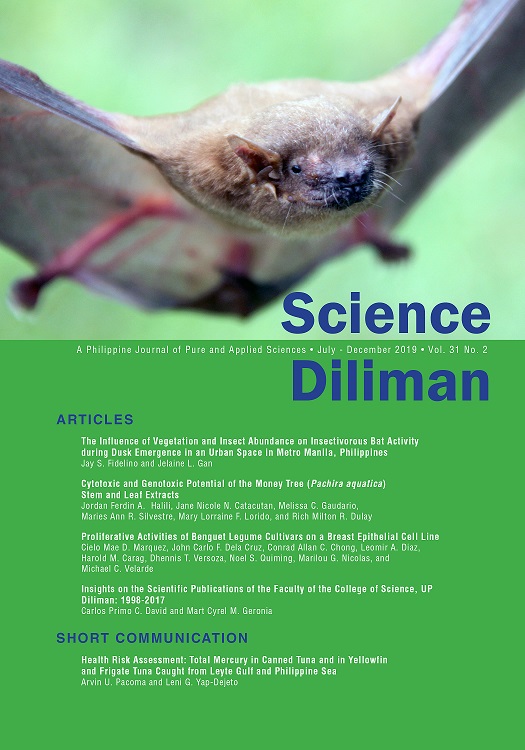Proliferative Activities of Benguet Legume Cultivars on a Breast Epithelial Cell Line
Abstract
Legumes are extensively cultivated around the globe for human consumption and may contain potential estrogenic activities that interfere with normal physiology and pathophysiology. However, different cultivars grown in different regions of the world have different activities that may provide different nutritional value. Hence, in this study, legume cultivars from Benguet, a major source of legumes and other highland vegetables in Northern Philippines, were evaluated for their proliferative effects in the breast epithelial cancer cell line MCF7. Ethyl acetate extracts from Phaseolus vulgaris L. and Vigna unguiculata (L.) Walp., but not from Tamarindus indica L. and Pisum sativum L., induced slight proliferative effects on MCF7 cells at a low dose but reduced cell number at a higher dose. The proliferative effect of the extracts is likely estrogen receptor (ER)-dependent, as the same legume extracts only displayed inhibitory effects in the ER-negative MDA-MB-231 cells. Similar proliferative effects of P. vulgaris and V. unguiculata ethyl acetate extracts were reflected in their similar HPLC profiles, which is distinct from the HPLC profile of the T. indica ethyl acetate extract. Overall, our findings show that certain legumes from Benguet have slight proliferative activities in MCF7 cells, implying their potential estrogenic activities.
Published
2020-06-22
Issue
Section
Articles
Keywords
beans, extracts, peas, Philippine plants, seeds
Submission of a manuscript implies: that the work described has not been published before (except in the form of an abstract or as part of a published lecture, review, or thesis); that it is not under consideration for publication elsewhere; that its publication has been approved by all co-authors, if any, as well as by the responsible authorities at the institute where the work has been carried out; that, if and when the manuscript is accepted for publication, the authors agree to the automatic transfer of the copyright to the publisher; that the manuscript will not be published elsewhere in any language without the consent of the copyright holders; that written permission of the copyright holder is obtained by the authors for material used from other copyrighted sources; and that any costs associated with obtaining this permission are the authors’ responsibility.



